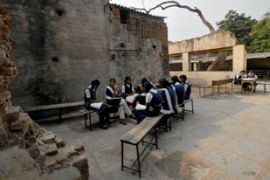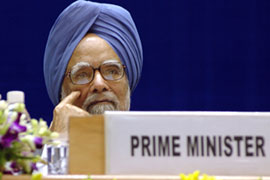India unveils education scheme
Programme to extend free schooling to 10 million children at a cost of $38bn.

“The fundamental right to education, as incorporated in our constitution, becomes operative from today. This demonstrates our commitment to the education of our children and to the future of India,” Singh said.
Unicef, Unesco and the International Labour Organisation have welcomed the act, saying it would help the world achieve the Millennium Development Goal of universal primary education.
However, critics say that the scheme might go the same way as other well-meaning pieces of legislation enacted in the liberal democracy, where the gap between legal rights and reality is often huge.
Free education
The Right to Education Act, passed by the Indian parliament in August 2009, promises to ensure free and compulsory education for children between the ages of 6 and 14 years old.
Under the act, schools will have at least one trained teacher per 30 students.
The implementation of the law, which fulfils a promise made at the birth of the republic in 1950, comes days after Sonia Gandhi, head of the ruling Congress party, was named the chair of a policy panel that would advise the government on social programmes.
 |
| Singh believes all children should be educated, irrespective of gender and social class [EPA] |
The Congress party was returned to power in 2009 on the back of pro-poor schemes such as one that guaranteed rural families 100 days of work in a year, but the coalition partners give the government a majority in parliament.
India spends three per cent of its annual budget on school education and building elementary schools in villages.
The country has improved its literacy rates to over 64 per cent of its 1.2 billion population. But experts say that many students can just barely read or write, and most state-run schools have inadequate facilities and untrained teachers.
The new law mandates that private educational institutions have to reserve a quarter of their places for children from disadvantaged sections of Indian society. Again, this condition has been argued by some schools as being unconstitutional.
The lack of quality education is one of the 10 factors holding India back from rapid economic growth that can push the nearly 300 million poor out of poverty, Goldman Sachs, the financial consultancy firm, says in a report.
“I was born to family of modest means. In my childhood I had to walk a long distance to go to school. I read under the dim light of a kerosene lamp. I am what I am today because of education,” Singh said in his speech on Thursday.
Singh, a former World Bank economist, is the architect of India’s economic liberalisation.